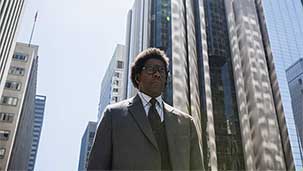November at the movies usually begins with me groaning, “Oh god, Oscar bait season.” I hope I’ll see at least a couple of decent films that I’ll remember fondly when the little golden men are handed out by beautifully dressed people opening the wrong envelope, but I know I’m mostly in for a stream of award season ’vehicles’ wherein some actor donning a prosthetic nose or aping a few superficial traits or skills will be hailed as a revelation. I still can’t quite believe we made such a fuss over Natalie Portman desperately flapping her arms in a feathered tutu for two hours, but I digress. Denzel Washington, twitching and shuffling his way through Roman J. Israel, Esq. as a legal savant somewhere on the spectrum, chases that award season love like a kid after an ice cream truck. And the film isn’t entirely undeserving, just… uneven.
The film feels like it was written three times, in three separate genres, and when it came time to pick one, writer/director Dan Gilroy went, “Why choose?!” And so we end up with an mish-mash of character study, legal drama, and thriller, all abruptly lurching against each other. However, I found myself unable to dismiss it completely, because there are small nuggets of plot in there that would have made for far more interesting viewing if they had been given more attention and room to expand. There is real potential in narrative threads that are begun, but are then inexplicably, frustratingly, forgotten. More interesting than the tale of a brilliant legal mind whose non-neurotypical ways make him a poor fit for the courtroom is the story of a civil rights era relic confronted with the changing face of activism in the 21st century. The latter is alluded to here and there, but the main focus is the former, which, because it is so clumsily executed, is actually the weaker narrative arc. The themes of downfall and redemption don’t really work, because it isn’t quite clear whose redemption the end goal is – Roman’s or that of his boss, and because the impetus and consequences of Roman’s downfall seem exaggerated and don’t make a whole lot of sense. Throughout the film, Roman carries a large, shabby briefcase containing his life’s work – a class action suit on plea bargain reform. It is brought up in passing now and then, and is only brought to the forefront in the final montage, and it feels like a missed opportunity. The real movie was in that brief case the whole time.
I had a hard time articulating my opinion of the film to my companion, who really enjoyed it. I didn’t dislike it, I just would have liked for all of its parts to connect a bit more neatly. The best way I could come up with to describe it was a Lego tower with poorly moulded bricks, and that’s what made me think of you. Your job was to oversee the elements of the physical construction of the film’s world, from rigging to carpentry. All of these elements need to be built so that they fit neatly together, plumb, with no jagged edges or uneven surfaces. In Roman J. Israel, Esq. all the pieces are there and in the right place, but the shaping of some pieces is just slightly off, so that the entire structure doesn’t quite level out properly. The complete picture is nice enough, but you can’t help but see where some parts warp, and where some elements had to be forced together with an extra bit of effort that really shouldn’t have been necessary.
Best,

Nat







